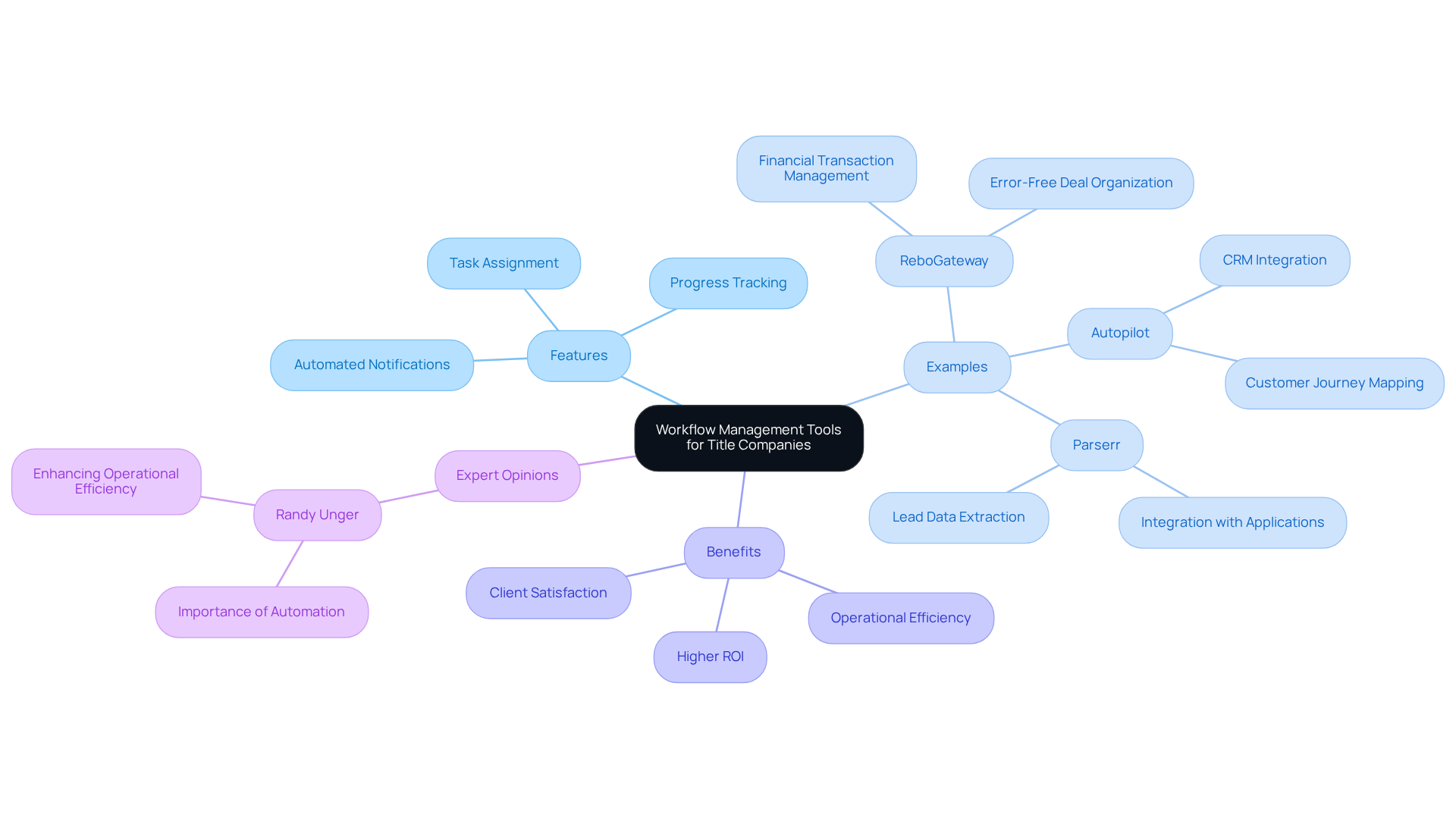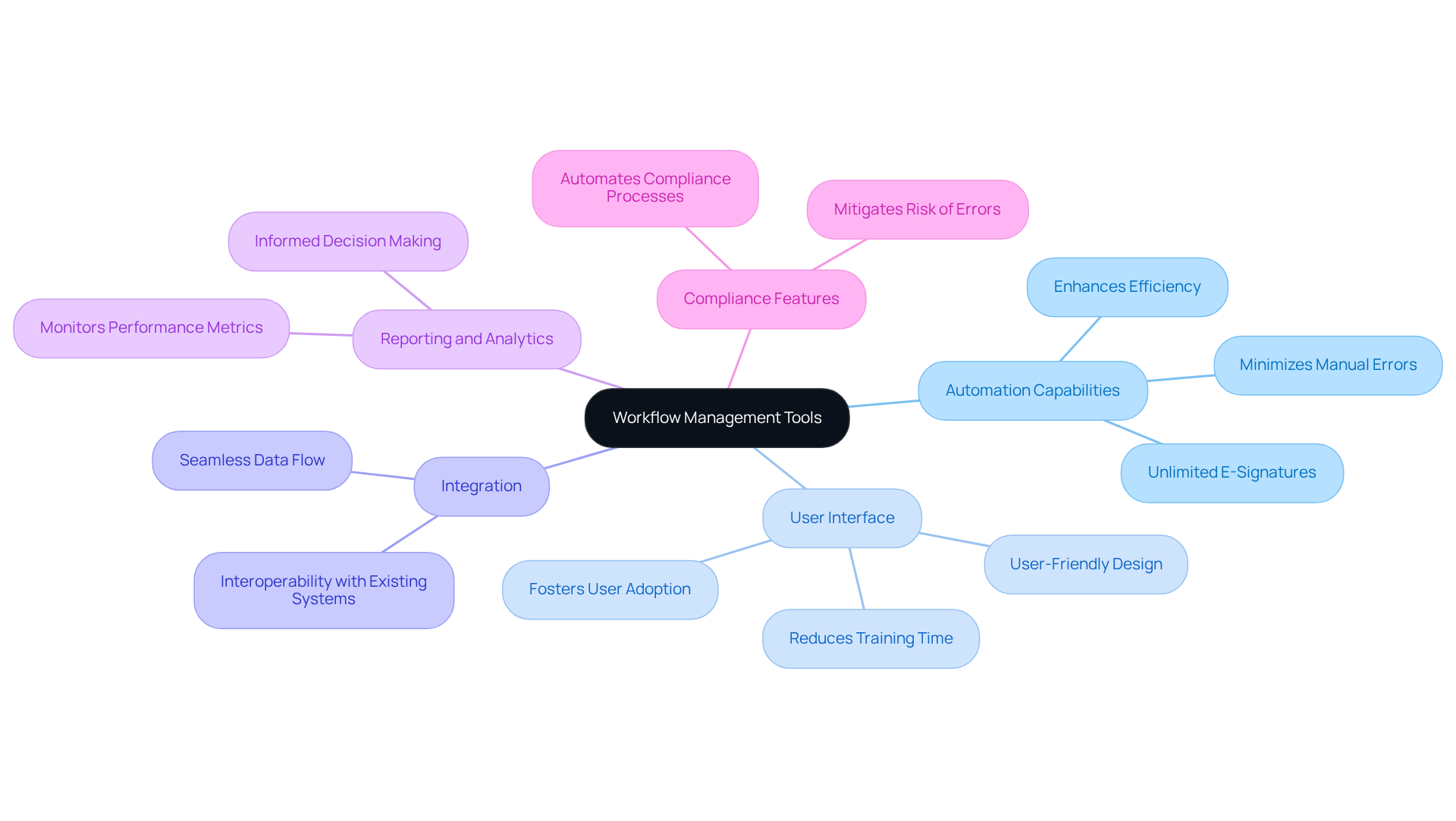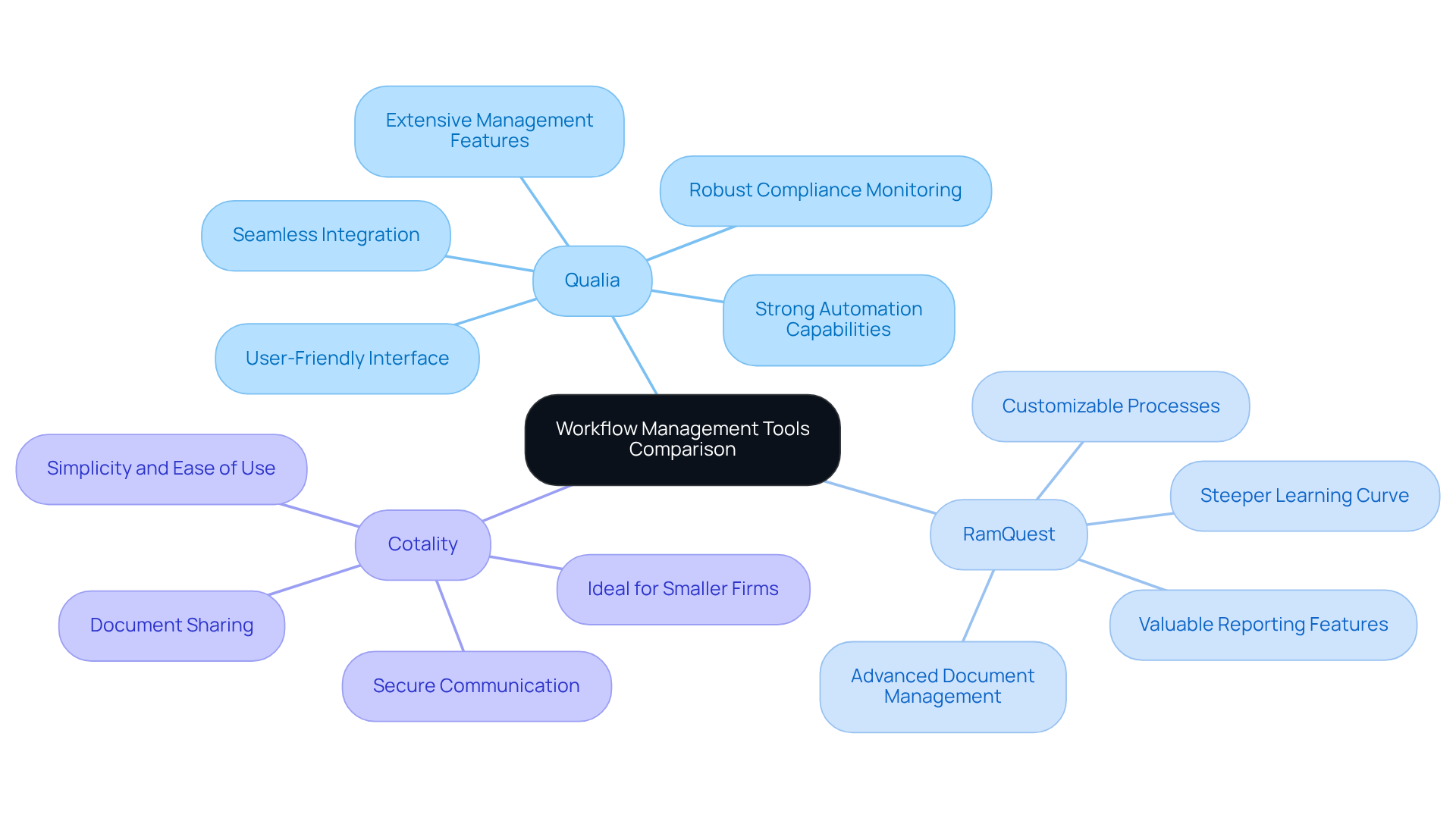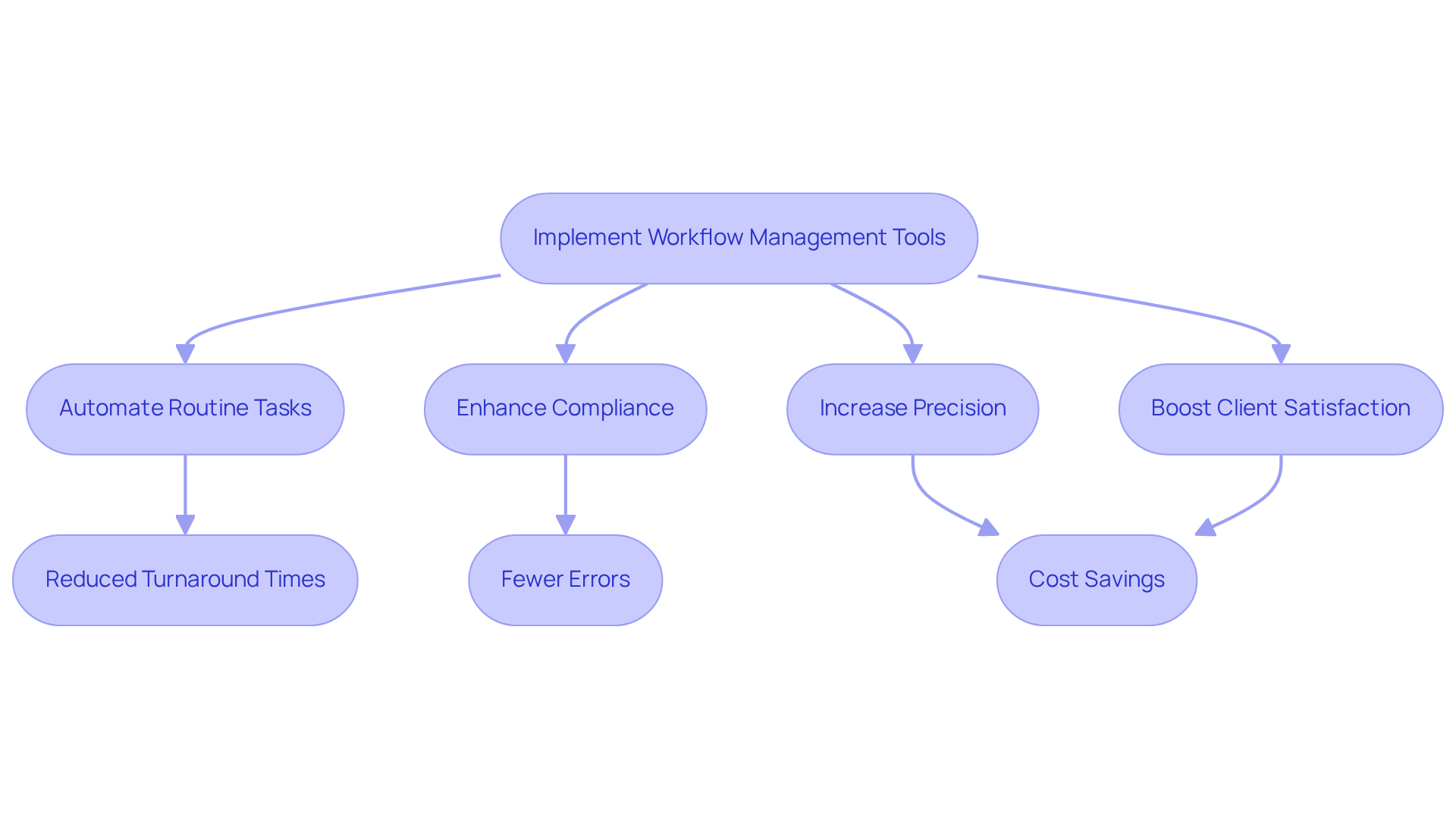Overview
Workflow management tools for title companies are indispensable for enhancing efficiency and automating critical processes such as title searches and document preparation. Their significance is underscored by features like:
- Automation
- User-friendly interfaces
- Compliance tracking
Collectively, these elements not only improve operational performance but also elevate client satisfaction in the fiercely competitive real estate market. Furthermore, the integration of these tools addresses the challenges faced by title companies, providing a robust solution that drives success.
Introduction
The landscape of title companies is rapidly evolving, propelled by technological advancements and changing client expectations. Workflow management tools have become indispensable assets, streamlining processes and enhancing operational efficiency within the real estate sector. As firms navigate the complexities of title searches and document management, a pressing question emerges: which features render these tools truly effective, and how do they compare in delivering value? This article explores the essential characteristics of leading workflow management solutions, providing insights into their capabilities and the transformative impact they can exert on title company operations.
Overview of Workflow Management Tools for Title Companies
Workflow management tools for title companies are essential software solutions that significantly enhance the efficiency and automation of various processes within property firms. These tools simplify critical tasks, including title searches, document preparation, and client interactions. By integrating features such as task assignment, progress tracking, and automated notifications, they ensure that processes remain efficient and compliant with legal standards. The importance of these tools is underscored by their ability to adapt to the evolving landscape of the real estate sector, where technological advancements and changing client expectations demand increased agility and responsiveness.
For instance, ReboGateway exemplifies how workflow management can streamline financial transaction processes, ensuring that real estate agents maintain organized and error-free dealings. Furthermore, Autopilot provides extensive resources for customer journey mapping and lead management, enabling real estate professionals to visualize and enhance their digital marketing strategies effectively. Additionally, Parserr's integration features with various applications significantly boost efficiency by automating lead data extraction, which is vital for organizations seeking to optimize their operations.
These case studies illustrate the tangible benefits of adopting management systems, which not only improve operational efficiency but also contribute to greater client satisfaction and retention. Automation, as highlighted by experts, can yield a higher return on investment and accelerate business growth for real estate agents, making the integration of these solutions imperative in today's competitive market.
Experts assert that incorporating workflow management tools for title companies is no longer optional but essential for companies aiming to succeed in a competitive landscape. As the sector continues to evolve, the ability to leverage these resources will be crucial for maintaining compliance and meeting the demands of contemporary real estate transactions. Randy Unger, a proponent of automation, notes that the significance of automation in the industry cannot be overstated, as it greatly enhances operational efficiency and responsiveness.

Key Features to Evaluate in Workflow Management Tools
When assessing workflow management tools for title companies, several essential features warrant careful consideration:
- Automation Capabilities: Effective tools automate repetitive tasks such as document generation and notifications, significantly minimizing manual errors and enhancing efficiency. For instance, platforms like Box offer at no charge, thereby simplifying processes without incurring additional costs. Automation through workflow management tools for title companies not only streamlines operations but also allows title researchers to focus on more complex tasks, ultimately boosting productivity.
- User Interface: A user-friendly interface is vital for ensuring that team members can navigate the software with ease. An intuitive design reduces training time and fosters user adoption, which is crucial for maximizing the tool's potential within the organization. Continuous improvements in user interface design, as exemplified by Parse AI, enhance the overall user experience and operational efficiency.
- Integration: The ability to seamlessly integrate workflow management tools for title companies with existing systems, including CRM and document management software, is essential for maintaining smooth operations. This interoperability ensures that data flows effortlessly between platforms, thereby enhancing overall workflow efficiency.
- Reporting and Analytics: Comprehensive reporting features empower firms to monitor performance metrics and identify areas for enhancement. By leveraging analytics, organizations can make informed decisions that drive operational improvements and strategic growth.
- Compliance Features: Tools equipped with compliance tracking capabilities are indispensable for ensuring adherence to legal requirements. By automating compliance processes, firms can significantly mitigate the risk of costly errors and uphold regulatory standards. As noted by industry leaders, investing in robust compliance features is essential for maintaining operational integrity.

Comparative Analysis of Leading Workflow Management Tools
In this comparative analysis, we examine three leading workflow management tools for title companies.
- Qualia: Renowned for its extensive management features tailored for escrow and property transactions, Qualia stands out with strong automation capabilities and seamless integration with other real estate software. Its user-friendly interface, coupled with robust compliance monitoring, positions it as a premier choice for firms seeking efficiency and reliability.
- RamQuest: This application excels in document management, offering customizable processes specifically designed for the real estate sector. RamQuest's advanced reporting features deliver valuable insights into operational efficiency; however, it is worth noting that its learning curve may be steeper for new users.
- Cotality: Emphasizing secure communication and document sharing, Cotality is ideal for businesses that prioritize client interactions. While it may not include some , its simplicity and ease of use present significant advantages for smaller firms.
Each of these tools possesses distinct advantages, and the selection will ultimately depend on the specific requirements and processes of the organization.

Impact of Workflow Management Tools on Title Research Efficiency
The implementation of workflow management systems significantly enhances efficiency in document investigation. By automating routine tasks, these systems minimize the time spent on manual processes, thereby enabling researchers to concentrate on the more complex aspects of their work. For instance, automated document creation and tracking can drastically reduce turnaround times for property searches and closings. Notably, industry insights reveal that emerged as the fastest-growing segment of the global enterprise software market in 2018, underscoring the broader trend towards automation across various sectors.
Furthermore, the integration of compliance features guarantees adherence to legal standards, thus mitigating the risk of errors that could lead to costly disputes. Title firms leveraging these systems frequently observe enhanced precision in their operations, culminating in increased client satisfaction and retention rates. A case study on Parse AI's innovative research platform illustrates how it enables researchers to finalize abstracts and reports with greater speed and accuracy, yielding substantial cost savings compared to traditional methods.
Consequently, the strategic deployment of workflow management tools for title companies has the potential to revolutionize the operational landscape, driving efficiency and elevating service delivery to unprecedented levels. As Ginni Rometty, former CEO of IBM, aptly stated, "AI will not replace humans, but those who use AI will replace those who don't," emphasizing the critical importance of embracing automation within the industry.

Conclusion
Workflow management tools are essential for title companies seeking to enhance operational efficiency and respond to the evolving demands of the real estate industry. By automating key processes, such as document preparation and client interactions, these tools streamline workflows and ensure compliance with legal standards. This ultimately leads to improved client satisfaction and retention.
The article highlights several critical features of effective workflow management tools, including:
- Automation capabilities
- User-friendly interfaces
- Integration with existing systems
- Robust reporting and analytics
- Compliance tracking
A comparative analysis of leading tools like Qualia, RamQuest, and Cotality illustrates how each platform offers unique advantages tailored to the specific needs of title companies. Moreover, the impact of these tools on title research efficiency is significant, showcasing how automation can reduce turnaround times and enhance accuracy in document investigations.
In light of these insights, the adoption of workflow management tools emerges not merely as an enhancement but as a necessity for title companies striving for success in a competitive landscape. Embracing these technologies empowers firms to optimize operations, adapt to changing market conditions, and ultimately deliver superior service to their clients. As the industry continues to evolve, investing in the right workflow management solutions is crucial for maintaining a competitive edge and ensuring long-term growth.
Frequently Asked Questions
What are workflow management tools for title companies?
Workflow management tools for title companies are software solutions designed to enhance the efficiency and automation of processes within property firms, simplifying tasks such as title searches, document preparation, and client interactions.
What features do workflow management tools typically include?
They typically include features such as task assignment, progress tracking, and automated notifications to ensure processes remain efficient and compliant with legal standards.
Why are these tools important for title companies?
They are important because they help title companies adapt to the evolving real estate sector, where technological advancements and changing client expectations require increased agility and responsiveness.
Can you provide examples of workflow management tools for title companies?
Examples include ReboGateway, which streamlines financial transaction processes, Autopilot, which assists with customer journey mapping and lead management, and Parserr, which automates lead data extraction.
What benefits do these tools provide to title companies?
The benefits include improved operational efficiency, greater client satisfaction and retention, and a higher return on investment through automation, which can accelerate business growth.
Is the use of workflow management tools optional for title companies?
No, experts assert that incorporating these tools is essential for companies aiming to succeed in a competitive landscape and to maintain compliance in contemporary real estate transactions.
How does automation affect the title industry?
Automation greatly enhances operational efficiency and responsiveness, making it a crucial component for success in the title industry, according to industry experts like Randy Unger.




